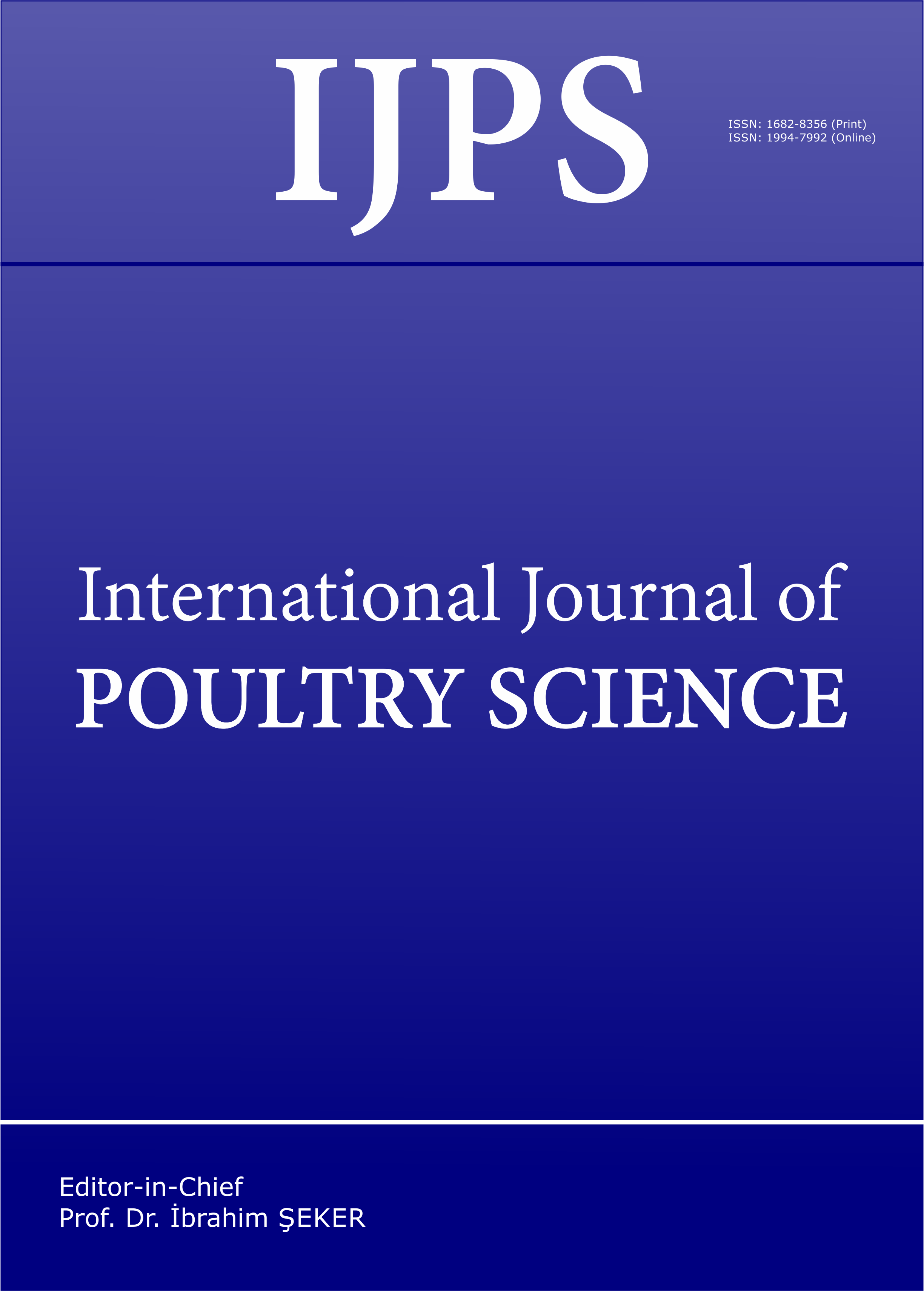Evaluation of Canola Meal from Biodiesel Production as a Feed Ingredient for Broilers
DOI:
https://doi.org/10.3923/ijps.2011.782.785Keywords:
Biodiesel, broilers, canola meal, performanceAbstract
This study was conducted to evaluate canola meal from biodiesel production as a feed ingredient for broilers. One-d-old commercial strain male broilers were randomly assigned to experimental diets with 0, 5, 10, 15, 20 and 25% canola meal. Diets were formulated to meet digestible amino acid requirements for periods of 0-14 d and 15-28 d. Each dietary treatment was replicated 6 times. Body weight and feed consumption were measured at 14 and 28 days of age. The results indicated that no significant (p>0.05) effect of canola levels was observed on feed intake, BW gain, feed conversion ratio, or mortality during the experimental period compared with control diets of soybean meal. Therefore, canola meal can be a valuable protein supplement for broilers when considered on a digestible amino acid basis. In this study, 25% canola was incorporated into broiler diets on a digestible amino acid basis without any negative effects on bird performance.
References
Aftab, U., 2009. Utilization of alternative protein meals with or without multiple-enzyme supplementation in broilers fed low-energy diets. J. Applied Poult. Res., 18: 292-296.
Ahmad, G., T. Mushtaq, M.A. Mirza and Z. Ahmed, 2007. Comparative bioefficacy of lysine from L-lysine hydrochloride or L-lysine sulfate in basal diets containing graded levels of canola meal for female broiler chickens. Poult. Sci., 86: 525-530.
Bell, M.J., 1993. Factors affecting the nutritional value of canola meal: A review. Can. J. Anim. Sci., 73: 689-697.
Clandinin, D.R., 1961. Rapeseed oil meal studies: 4. Effect of sinapine, the bitter substance in rapeseed oil meal, on the growth of chickens. Poultry Sci., 40: 484-487.
Classen, H.L., J.M. Bell and W.D. Clark, 1991. Nutritional value of very low glucosinolate canola meal for broiler chickens. Proceedings of the GCIRC 8th International Rapeseed Congress, July 9-11, 1991, Saskatoon, Saskatchewan, Canada, pp: 390-395.
Dale, N., 1996. Variation in feed ingredient quality: Oilseed meals. Anim. Feed Sci. Technol., 59: 129-135.
FASS, 2010. Guide for the Care and Use of Agricultural Animals in Research and Teaching. 3rd Edn., Federation of Animal Science Societies, Champaign, Illinois, ISBN: 9781884706110, Pages: 169.
Hickling, D., 2001. Canola meal feed industry guide. 3rd Edn., Canadian International Grains Institute, Winnpeg, Manitoba, Canada, pp: 16-21.
Kocher, A., M. Choct, M.D. Porter and J. Broz, 2000. The effects of enzyme addition to broiler diets containing high concentrations of canola or sunflower meal. Poult. Sci., 70: 1767-1774.
Nassar, A.R. and G.H. Arscott, 1986. Canola meal for broilers and the effects of dietary supplement of iodinated casein on performance and thyroid status. Nutr. Rep. Int., 34: 791-799.
Newkirk, R.W. and H.L. Classen, 2002. The effects of toasting canola meal on body weight, feed conversion efficiency and mortality in broiler chickens. Poult. Sci., 81: 815-825.
Perez-Maldonado, R.A., K.M. Barram and D.N. Singh, 2003. How much canola or cottonseed meals can be used for commercial chicken meat production. Asia Pac. J. Clin. Nutr., 12: S41-S41.
Ramesh, K.R., G. Devegowda and H. Khosravinia, 2006. Effects of enzyme addition to broiler diets containing varying levels of double zero rapeseed meal. Asian-Aust. J. Anim. Sci., 19: 1345-1360.
SAS Institute, 1991. SAS@ user's guide: Statistics. 6.03 Ver., SAS Institute, Inc., Cary, NC.
Slominski, B.A. and L.D. Campbell, 1990. Non-starch polysaccharides of canola meal: Quantification, digestibility in poultry and potential benefit of dietary enzyme supplementation. J. Sci. Food Agric., 53: 175-184.
Shires, A., J.M. Bell, J.A. Blake, P. Fedec and D.I. Mcgregor, 1983. The feeding value of canola meal for broiler chickens as affected by heat and steam during desolventization and by fibre reduction. 7th Project Report, Research on Canola Seed, Oil, Meal and Meal Fractions. Canola Council of Canada, Winnipeg, Manitoba, Canada, pp: 12-16.
Yan, F., C. Coto, Z. Wang, S. Cerrate, S.E. Watkins and P.W. Waldroup, 2010. Comparison of nutrient recommendations for broilers. Int. J. Poult. Sci., 9: 1006-1014.
Zuprizal, M. Larbier and A.M. Chagneau, 1992. Effect of age and sex on true digestibility of amino acids of rapeseed and soybean meals in growing broilers. Poult. Sci., 71: 1486-1492.
Downloads
Published
Issue
Section
License
Copyright (c) 2011 Asian Network for Scientific Information

This work is licensed under a Creative Commons Attribution 4.0 International License.
This is an open access article distributed under the terms of the Creative Commons Attribution License, which permits unrestricted use, distribution and reproduction in any medium, provided the original author and source are credited.

